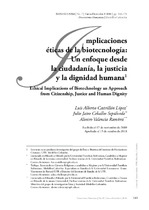| dc.contributor.author | Castrillón López, Luis Alberto | |
| dc.contributor.author | Ceballos Sepúlveda, Julio Jairo | |
| dc.contributor.author | Valencia Ramírez, Alveiro | |
| dc.coverage.spatial | Seccional Medellín | spa |
| dc.date.accessioned | 2021-02-05T17:39:02Z | |
| dc.date.available | 2021-02-05T17:39:02Z | |
| dc.date.issued | 2010 | |
| dc.identifier.uri | http://hdl.handle.net/20.500.11912/7890 | |
| dc.description | p. 163 - 174 | spa |
| dc.description.abstract | La preocupación ética, que en su comienzo estaba circunscrita al ámbito íntimo y familiar, se ha extendido ahora incluso hasta las relaciones con el medio ambiente. Pero esta ampliación no trajo consigo mayor certidumbre moral y, al contrario, ésta ha disminuido. La biotecnología precisamente es uno de los ámbitos de acción humana en los que puede omitirse cada vez menor. De ahí la necesidad de preguntarse por sus implicaciones éticas. Las tradiciones de inspiración kantiana y anglosajona resultan insuficientes para dar respuesta a estas nuevas cuestiones. Igual sucede con el recurso a la neutralidad de la ciencia y la tecnología. En consecuencia, se requiere un equilibrio reflexivo para afrontar la incertidumbre moral en el campo biotecnológico y una ética de responsabilidad compartida en tres ámbitos de regulación: ético, jurídico y político, apoyada a su vez en tres elementos: justicia, dignidad humana y participación ciudadana. En último término, se trataría de una juridificación de la bioética. | spa |
| dc.description.abstract | The ethical concern that in the beginning was limited to family and intimate level, has now spread even to relations with the environment. But this expansion did not bring greater moral certainty and, conversely, it has decreased. Biotechnology is precisely one of the areas of human activity in which it is decreasing. Hence the need to ask for its ethical implications. The traditions of Anglo-Saxon and Kantian inspiration are insufficient to meet these new issues. The same happens with the appeal to the neutrality of science and technology. Therefore, a balance is needed to address reflective moral uncertainty in the biotechnology field, and an ethic of shared responsibility in three areas of regulation: ethical, legal and political, supported in turn on three elements: justice, human dignity and participation. Ultimately, it would be a juridification of bioethics. | spa |
| dc.format.mimetype | application/pdf | |
| dc.language.iso | spa | |
| dc.publisher | Universidad Pontificia Bolivariana | spa |
| dc.relation.ispartof | Pensamiento humanista | spa |
| dc.rights | Attribution-NonCommercial-NoDerivatives 4.0 International | * |
| dc.rights.uri | http://creativecommons.org/licenses/by-nc-nd/4.0/ | * |
| dc.subject | Bioética | spa |
| dc.subject | Biotecnología | spa |
| dc.subject | Ciencia y Bioética | spa |
| dc.subject | Bioética y Derecho | spa |
| dc.subject | Investigación Genética | spa |
| dc.subject | Bioethics | spa |
| dc.subject | Biotechnology | spa |
| dc.subject | Science and Bioethics | spa |
| dc.subject | Bioethics and Law | spa |
| dc.subject | Genetic Researc | spa |
| dc.title | Implicaciones éticas de la biotecnología: Un enfoque desde la ciudadanía, la justicia y la dignidad humana | spa |
| dc.title.alternative | Ethical Implications of Biotechnology an Approach from Citizenship, Justice and Human Dignity | spa |
| dc.type | article | spa |
| dc.rights.accessRights | openAccess | spa |
| dc.type.hasVersion | publishedVersion | spa |
| dc.description.sectional | Medellín | spa |
| dc.identifier.instname | instname:Universidad Pontificia Bolivariana | spa |
| dc.identifier.reponame | reponame:Repositorio Institucional de la Universidad Pontificia Bolivariana | spa |
| dc.identifier.repourl | repourl:https://repository.unab.edu.co/ | |


